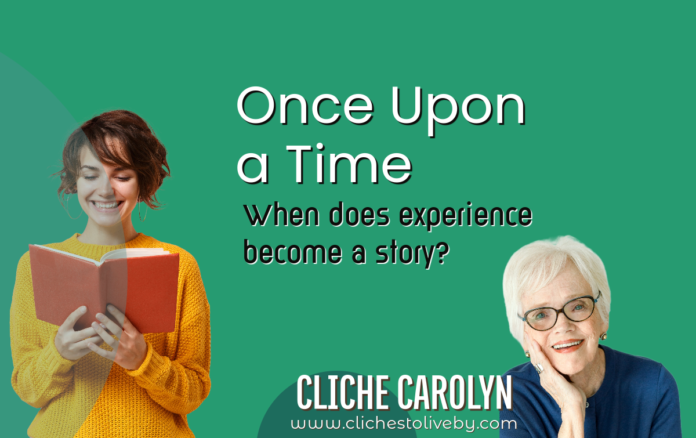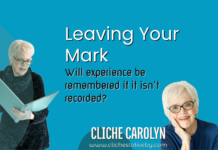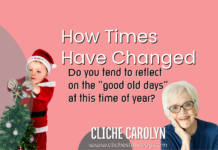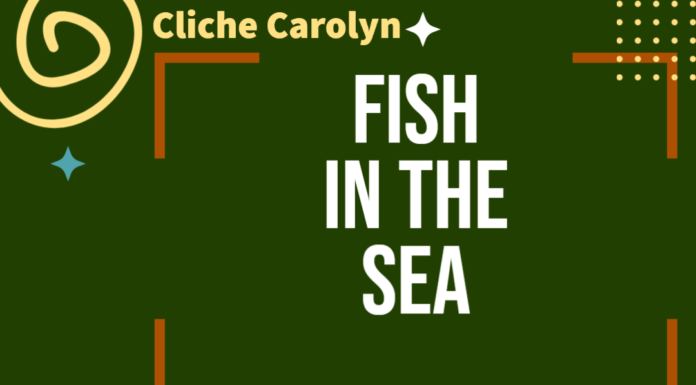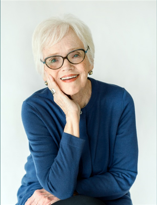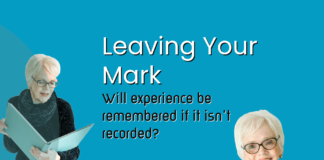Dr. Carolyn Lee reflects on a different cliché each week. Recently, in her blog “The Sunny Side of the Street,” she looks at the subject of “cheerfulness.” This week Carolyn explores the cliché, once upon a time
Learn more about Dr. Carolyn Lee on her biography page or investigate 29 more clichés in her latest book, Keep Your Eye on the Ball And Other Clichès to Live By.
Once Upon a Time
I recently saw Ann Patchett interviewed on the PBS Evening News. She spoke of her new book, Tom Lake, which begins in a high school gymnasium where auditions for Our Town are being held by a local theater company. Patchett chose Our Town as the play on which she would base her story because it is a simple play about everyday life in a small, fictional New Hampshire town. She said, “It’s about paying attention to all of the small moments of your life, realizing that your life really is just a compilation of small moments, and either you are awake to them and pay attention to them, or you are always looking ahead, and you miss your life.” She went on to ask, “What are we except a bunch of stories, a compilation of the stories we’ve lived and that we’ve told ourselves and other people over the course of our lives?”
Yes, indeed. What are we except a bunch of stories? I spent my professional life as a teacher and speaker. I considered myself, primarily, a teller of stories. I told them to illustrate the points I was attempting to make, to exemplify the principles I was trying to communicate. Most of the stories I told came from my own experience. I used them as analogies, as parables.
Years ago, I stood in front of an Up with People cast and told them a lot of stories in an effort to teach them something about life on the road. After our session, one of the students and I were walking to lunch, and she said to me, “Do you think more things happen to you than happen to most people, or do you just think about the things that happen to you in a different way?” I’m sure this young lady has completely forgotten our encounter, but I have thought of that question many times. The answer, I think, is yes, probably more things have happened to me than have happened to a lot of people, partly because I’ve been around a long time. I’ve been to a lot of places and met a lot of people and seen a lot of things. But it is also true that I tend to think about my experiences in a “different way.” I tend to reflect on them, to try to find meaning in them, to see them as illustrations or examples of a point or principle. I tend to use them—to entertain or explain or demonstrate or persuade.
Many of the stories I’ve told from the front of the room I have told dozens of times. Some of them are recollections of things that happened a long time ago. The truth is, I no longer remember the experience itself; I remember the story I have always told about it. If I hadn’t told the stories, the experiences would probably be lost to me; I tend to forget.
We all have stories to tell. Or, at least, we have the raw material for stories. Raw material becomes a story only when we tell it. The stories we choose to tell and the ways in which we tell them say a lot about who we are and how we want others to perceive us.
Two years ago, I wrote a book in which I related a bunch of personal experiences. It is a storybook. I told those stories in order to draw some conclusions from them, to illustrate some points, to express and explain some of my attitudes and opinions. The stories are simple. I told about climbing out of the Grand Canyon to say something about the satisfaction of accomplishing a difficult task. The story of my experience as a docent dropout expressed what I had learned about the subjectivity of evaluating modern art. I used my story about snorkeling at the Great Barrier Reef to make some points about the levels and depths at which we can experience life. I wrote about my father and the depression he suffered after having a stroke to illustrate our need to appreciate what we have while we have it. All the stories I included in the book were stories I had told to myself in an effort to understand my own experience.
Telling stories, as it turns out, is a way of making sense of our lives. Life is chaotic; it is complicated and often mundane. It can be random, incoherent, and inexplicable. One way humans try to make sense out of their lives is by condensing their thoughts and stitching together narratives, creating some order and understanding out of chaos. This allows us to impose order on the world and live in it more peaceably. Joan Didion went so far as to say, “We tell ourselves stories in order to live.”
Communicating our experience to others—in words—is a way of passing on our understanding, of sharing the lessons we’ve learned, of saying something about who we are. If we don’t turn our experiences into stories and tell them, they will be of no particular significance to anyone but us. Your compilation of stories deserves to be shared. Where to begin? How about, “Once upon a time . . .”?
Want to Read More?
Check out Dr. Carolyn Lee’s blogs on her website, she features a new cliché each week or you can order her new book, Keep Your Eye on the Ball And Other Clichès to Live By. Want to know more about the woman behind the words? Read more about Carolyn here. We hope you enjoyed this article learning more about the cliché, once upon a time.
